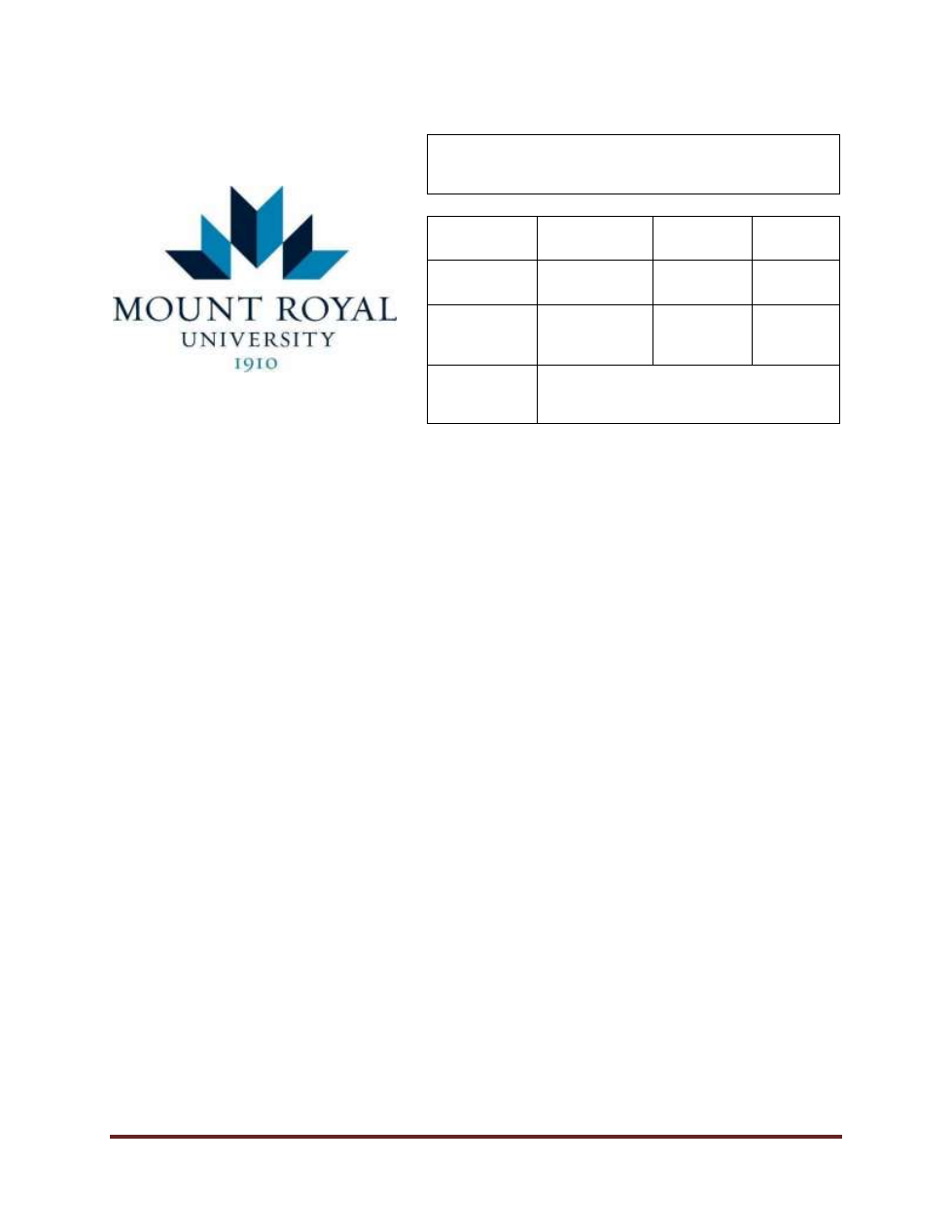
Gender-Based Violence Prevention and Response Procedures
– May 25, 2023 – Page 1 of 11
GENDER-BASED VIOLENCE AND MISCONDUCT
PREVENTION AND RESPONSE PROCEDURES
Procedure Type: Management
Initially
Approved:
May 25, 2023
Procedure
Sponsor:
President
Last Revised:
May 25, 2023
Primary Contact:
Vice-President
Students & Vice-
President Finance
and Administration
Review
Scheduled:
May 25, 2028
Approver:
Board of Governors
A. PROCEDURES
The document outlines the procedures associated with the Gender-Based Violence Prevention and
Response Policy and provides guidance on how the University prevents and addresses incidents
of Gender-Based Violence and Misconduct.
Dating, Domestic, and Sexual Violence (DDSV) Services has been established to provide guidance
and confidential support regarding matters of Gender-Based Violence and Misconduct prevention
and response at the University. The contact information for DDSV Services is available online and
will be included within all relevant educational and information resources about the DDSV Services.
DDSV Services will work directly with the Gender-Based Violence and Misconduct Advisory
Committee in providing the ongoing review and evaluation of the activities and strategies
associated with the Policy.
1.
CONFIDENTIALITY
1.1
Anyone who receives a Disclosure, Report, or who is involved in investigating or
resolving incidents of Gender-Based Violence and Misconduct will make every
reasonable effort to protect the personal information and maintain confidentiality of
both the Complainant and the Respondent by:
a.
c
ollecting only relevant information and keep all information, including names,
incident details, investigation details, and outcomes, confidential and private;
b.
u
sing information collected only for the purpose of supporting, responding, and
resolving the situation;
c. only providing necessary and relevant information to appropriate University
Officials with a defined role within the Policy.
d.
i
nforming individuals involved within an incident of Gender-Based Violence
and Misconduct in advance when private or confidential information must be
shared with others. In the exceptional circumstances where confidential
information must be shared (as outlined within section 12.3 of the Policy) the
following steps will be taken:

Gender-Based Violence Prevention and Response Procedures
– May 25, 2023 – Page 2 of 11
i.
Inform the individual why the determination is being made that
confidential information must be shared;
ii.
Inform the individual what information will be shared and with whom;
iii.
Inform the individual when the information will be shared;
iv.
Inquire about and provide appropriate resources necessary to support
the individual to address the impact for the sharing of the information;
v.
Provide the individual with relevant updates about actions that have
occurred as a result of sharing of the information.
e. The information and records associated with Gender-Based Violence and
Misconduct will be treated in a confidential manner and handled in accordance
with the Freedom of Information and Protection of Privacy Act and the
University Records and Information Management Program Policy.
2.
DISCLOSURES
2.1
Any member of the University Community can receive a Disclosure of Gender-Based
Violence and Misconduct and does not normally initiate an investigation unless the
person who has experienced the violence chooses to submit a Report. Anyone
receiving a Disclosure should always respond with compassion by treating the
individual
with
respect
and
uphold
their
dignity
by:
a. ensuring the person is safe;
b. recognizing that disclosing such an incident can be traumatic and that every
individual may have different reactions and requirements;
c.
l
istening without judgement and communicate that Gender-Based Violence
and Misconduct is not the fault of the person who has experienced it;
d. avoiding asking for details about what happened or expressing opinions about
what someone should do;
e. making the person aware of the Policy and the confidential support and
assistance available through DDSV Services;
f.
providing options about what to do next and respecting the person’s choice
about what actions they wish to take or not take;
g. make every effort to respect their confidentiality and anonymity.
2.2
Members of the University Community who receive a Disclosure are encouraged to
confidentially contact DDSV Services to discuss receiving a disclosure. Confidential
contact can be made in person, phone, or email. The purpose of contacting DDSV
Services is to support the person who received the Disclosure and ensure that the
person who made the Disclosure has been provided the necessary information and
the Policy has been followed. Those contacting DDSV Services are not required to
provide any identifying information about the person who made the Disclosure or the
details about the incident of Gender-Based Violence and Misconduct unless the
person who made the Disclosure has given their explicit consent.
2.3
Individuals who have made a Disclosure should be made aware that they are eligible
to receive resources and Accommodation Supports whether or not the individual
wishes to make a Report.

Gender-Based Violence Prevention and Response Procedures
– May 25, 2023 – Page 3 of 11
3.
ACCOMMODATION SUPPORTS
3.1
DDSV Services will work with the person who has experienced Gender-Based
Violence and Misconduct and/or the person who received the Disclosure to
determine any reasonable and appropriate Accommodation Supports and facilitate
the implementation of the identified Accommodation Supports by:
a.
r
eviewing the relevant details of the Gender-Based Violence and Misconduct;
b.
a
ssessing the impacts of the Gender-Based Violence and Misconduct on the
individual’s role within the University;
c.
s
uggesting potential Accommodation Supports and identifying the actions that
would be necessary to implement the Accommodation Supports, the
necessary duration, and identifying any other person(s) who will be needed to
support the implementation of the Accommodation Supports;
d. implementing the Accommodation Supports either directly or with the support
of the previously identified person(s) or department(s) once the
Accommodation Supports have been agreed upon;
e.
m
onitoring the effectiveness of any Accommodation Supports and adjusting
as
necessary.
3.2
Members of the University Community may need to be contacted to achieve
Accommodated Support, for example a faculty member may be asked to provide an
extension of a student’s academic deadline. To maintain the privacy and
confidentiality of individuals involved, only information necessary for the
Accommodation Supports are provided.
4.
REPORTING
4.1
Individuals can make a Report directly to DDSV Services to initiate a complaint
process. DDSV Services will provide information about all Reporting options, both
internal and external, and can support the individual throughout the complaint
process.
4.2
When an individual chooses to submit an internal complaint under a University
Policy, a Report is submitted to the appropriate Policy Agent as determined by the
relationship the person (Respondent) who is alleged to have conducted the Gender-
Based Violence and Misconduct has to the University as follows:
a.
Respondent is Student Respondent: Report submitted to the AVP Student
Experience and Success to be investigated in accordance with the Code of
Student Community Standards Policy.
b.
Respondent is an Employee, volunteer, appointee, or others acting on behalf
of the University: Report submitted to the Associate Vice President Human
Resources to be investigated in accordance with the Workplace Violence and
Harassment Prevention Policy.
c.
Respondent is not a member of the University Community: Report is submitted
to the Manager of Security Services to be reviewed in accordance with all
University safety requirements.
4.3
If a Complainant wishes to seek Alternative Resolutions as outlined within Section 7
of the Policy, they may do so by adding the request within their Report. This should
include information about the Alternative Resolution being requested and the reason
for the request.

Gender-Based Violence Prevention and Response Procedures
– May 25, 2023 – Page 4 of 11
4.4
Anonymous and Third Party Reports can be submitted to DDSV Services who will
assess and submit the Report to the appropriate University Official to determine how
the Report can be addressed in accordance with University policies.
5.
INTERIM MEASURES
5.1
Upon the review of the Report, if the Policy Agent identifies the existence of
immediate, ongoing, or possible risk to others or the University they will consult with
the Chief Safety and Risk Officer to assess and determine what, if any, Interim
Measures are necessary as per section 9 of the Policy.
5.2
The Policy Agent will provide the Chief Safety and Risk Officer with the Report and
assess the risk and determine any appropriate Interim Measures.
5.3
The Policy Agent will consult with the Complainant regarding the impact of the
identified Interim Measures prior to implementation.
5.4
The Policy Agent will provide a written notice of Interim Measures to those assigned
measures and to any University Official who must be aware of the Interim Measures
in order to implement or to ensure compliance.
5.5
Any individual assigned and/or those impacted by an Interim Measures may contact
the Policy Agent and/or the Chief Safety and Risk Officer with a request to review
the Interim Measures.
5.6
Any Interim Measure applied will be reviewed as necessary but at minimum within
30 days or as requested by someone impacted by the Interim Measures, pending
the completion of the Investigation.
6.
ALTERNATIVE RESOLUTIONS
6.1
When a Report includes a request for Alternative Resolutions the Policy Agent will
review the request as per section 7 of the Policy.
6.2
The Policy Agent will review the Report and the request for Alternative Resolutions
and consult with DDSV Services regarding the request.
6.3
It is the decision of the Policy Agent whether or not the Alternative Resolution
request is an appropriate outcome given the nature of the Report and provide the
Complainant with reasons for their decision.
6.4
If the Policy Agent determines that Alternative Resolutions is an appropriate
outcome, the Respondent will be notified of the Report and the requested Alternative
Resolutions.
6.5
A
ny Alternative Resolution(s) are voluntary and must be agreed to by the Policy
Agent, the Respondent, and the Complainant. Any party may change their mind and
choose not to engage with the Alternative Resolution process prior to the completion
process.
6.6
Any Alternative Resolution(s) implemented must include agreement on the terms of
the documentation and records associated with the resolution as:

Gender-Based Violence Prevention and Response Procedures
– May 25, 2023 – Page 5 of 11
a.
Alternative Resolution(s) are considered informal and will not be used within
any formal University process;
b.
Any records associated with an Alternative Resolution will only be maintained
for the purposes and terms as agreed.
7.
INVESTIGATING REPORTS
7.1
All Reports involving possible violations of the Policy will be reviewed in a timely
manner and in accordance with the policy to which the Report was submitted.
7.2
If the Policy Agent determines the Policy applies, they will initiate an investigation
process of the Report in accordance with the associated Policy and will include steps
such as:
a. determining if there are multiple proceedings as per section 8 of the Policy by:
i.
confidentially consulting with the Policy Agent responsible for the
administration of the other policy(s);
ii.
providing only relevant details of the situation necessary to determine if
another policy applies;
iii.
identifying the process that will be used to resolve all associated policy
requirements if Multiple Proceedings apply to the Report;
iv.
informing the parties involved of the process that will be used for
investigating and resolving the Report when Multiple Proceedings are
involved.
b. determining who is the Complainant(s) and Respondent(s). The University can
serve as the Complainant if deemed appropriate by the Policy Agent.
c. consulting or conferring with University Officials in the determination of
appropriate processes when necessary.
d. assigning an Investigator as per the terms of the respective Policy to which the
Report was submitted. Any person assigned to serve as an Investigator will
utilize Trauma-Informed investigation practices such as:
i.
informing participants that they are able to have a Support Person present
at all stages of the process;
ii.
permitting the Complainant to revoke their complaint at any time
throughout the process;
iii.
providing a process that does not require the Complainant and Respondent
to be present at the same time at any stage of the Investigation or
resolution process;
iv.
providing flexibility in the location and method of participation at the various
stages of the investigation including in person, virtual, and written modes
of participation;
v.
informing the Complainant in advance about the process, their rights,
options to provide their account, and discuss their desired outcomes;
vi.
informing the Respondent in advance about the investigation process, their
rights, a summary of the allegations, and the options to provide their
account. Following this step, the Respondent will be provided with a more
detailed account of the allegations and be asked to respond and share their
account of the Report. Should the Respondent choose not to participate

Gender-Based Violence Prevention and Response Procedures
– May 25, 2023 – Page 6 of 11
in the investigation process a determination of responsibility will be
completed using the information available;
vii.
gathering of relevant information and/or conducting interviews with
Witnesses or others with knowledge of the Report;
viii.
determining whether or not the allegations within the report are
substantiated using a standard of the balance of probabilities;
ix.
making a summary of the findings of the investigation available to the
Complainant and Respondent and providing both parties with an
opportunity to ask questions or seek clarification from the investigator
about the findings report prior to the completion of the investigation.
7.3
Once the investigation is completed, the Investigator will communicate the findings
of the investigation to the Policy Agent in order to determine if the findings of the
Report violate the Policy, and if so, the application of any outcomes as outlined within
the Policy to which the Report was submitted.
8.
DECISION MAKING AND RESOLUTIONS
8.1
Once an investigation of a Report is complete, the Policy Agent will review the
findings and determine if the findings constitute a violation of this Policy and will
implement the appropriate decision making process as per the associated policy.
8.2
A Policy Agent and/or the person responsible for determining the outcome
associated with the policy may choose to meet with the Respondent and/or the
Complainant (not at the same time) to review the investigation findings, the process,
or discuss the Report.
8.3
All decisions regarding a finding of responsibility will be made using the standard of
the balance of probabilities; whether it was more likely or not to have taken place.
8.4
In order to determine appropriate resolution(s), decisions will be made by
considering the relevant findings of the Report and such factors as:
●
the extent of the misconduct;
● t
he harm caused by the behaviour(s);
● w
hether the behaviour was inadvertent or deliberate in nature;
● w
hether the behaviour was an isolated action or as part of a pattern of
behaviours;
● w
hether the behaviour can be reasonably understood to be the result of a
documented health condition or other extenuating circumstances;
●
a
ny other mitigating or aggravating circumstances.
9.
APPEAL
9.1
Appeal of decisions made in association with this Policy are determined by the terms
of the Policy by which the decision was made.

Gender-Based Violence Prevention and Response Procedures
– May 25, 2023 – Page 7 of 11
10.
PREVENTION AND AWARENESS
10.1
The DDSV Services will develop, oversee, and coordinate the awareness,
prevention, education, and training initiatives associated with this Policy such as:
a.
developing and maintaining materials and resources that inform the University
Community about Gender-Based Violence and Misconduct supports,
Reporting options, and other related information;
b.
maintaining up to date information about relevant on and off campus resources
and services;
c.
developing, delivering and assessing education initiatives that raise
awareness of the prevalence, nature, and relevance of Gender-Based
Violence and Misconduct within the University;
d.
developing, delivering, and assessing training programs that support the
University Community’s ability to understand, recognize, prevent, and respond
to Gender-Based Violence and Misconduct;
e.
ensuring education and training programs are up to date and relevant, and
include:
i.
e
ncouragement of prosocial behaviors and a culture of healthy and
respectful relationships and be informed by relevant best practices;
ii.
acknowledgement of the social, colonial and historical contexts that
Gender-Based Violence exists within;
iii.
acknowledgement of how power dynamics influence Gender-Based
Violence;
iv.
acknowledgement that intersectional identities influence how Gender-
Based Violence is experienced; and,
v.
acknowledgement that Gender-Based violence exists within a
continuum of violence
10.2
The University will establish the Gender-Based Violence and Misconduct Advisory
Committee (Committee) which will consist of Students and Employees who have
expertise and interest in Gender-Based Violence response and prevention and
include University Officials with roles associated with the Policy. The Committee
will serve as an ongoing resource in the development and evaluation of the Gender-
Based Violence and Misconduct services, education, training, and prevention
strategies including the ongoing review of this Policy and associated procedures.
The Committee will have no role in advocating, supporting, or investigating any
incidents of Gender-Based Violence and Misconduct.
10.3
The DDSV Services will have responsibility for the oversight of the Advisory
Committee as follows:
a.
appointing a Chair of the Committee.
b.
appointing members of the Committee or a 1 (one) year term with an option
for renewal, and will strive to include members that represent the University
Community with at least:
i.
two (2) faculty members with knowledge or expertise in Gender-Based
Violence;
ii.
three (3) students with knowledge or expertise in Gender-Based
Violence;,

Gender-Based Violence Prevention and Response Procedures
– May 25, 2023 – Page 8 of 11
iii.
a Human Resources representative;
iv.
an external Gender-Based Violence agency representative;
v.
a Wellness Services representative;
vi.
a Security Services representative;
vii.
a Joint Occupational Health and Safety Committee representative;
viii.
a Student Affairs representative;
c.
meeting at least once per academic year.
11.
RECORDS AND REPORTING
11.1
Dating, Domestic, and Sexual Violence Services will maintain appropriate records of
actions taken under this Policy and will prepare an annual statistical report. The
statistical report shall be anonymized and ensure no identifying information is
included.
11.2
All documents and records collected as a result of these policies and procedures will
be maintained in compliance with the University’s Records Policy and the Alberta
Freedom of Information and Protection of Privacy Act.
B. DEFINITIONS
(1)
Accommodation
Supports:
are actions that help facilitate the emotional and physical safety and
wellbeing of a person who has been affected by Gender-Based
Violence and Misconduct and assist the individual’s ability to continue
their existing relationship and role with the University.
(2)
Alternative
Resolutions
Means a voluntary process sought by the individual who experienced
Gender-Based Violence and Misconduct and agreed to by the
Respondent as a way to appropriately resolve the incident
(3)
Anonymous Report
means the option for an individual who experienced Gender-Based
Violence and Misconduct to submit a Report without being required to
identify themselves. Anonymous reporting can be provided directly to
DDSV Services either in person or using the online reporting form;
(4)
Complainant:
means the person or harmed party, who brings forward information
that a violation of a policy may have occurred.
(5)
Consent:
is an ongoing, conscious and active agreement, through words or
gesture, to sexual activity.
(6)
Disclosure:
a verbal or written account by a person about their experience of
Gender-Based Violence and Misconduct.
(7)
Employee:
means individuals who are engaged to work for the University under
an employment contract, including but not limited to faculty, staff,
exempt, casual and management employees.
(8)
Gender-Based
Violence and
Misconduct
is an umbrella term that encompasses a broad range of behaviours,
whether by word or action, that use and abuse the control over
another person and is perpetrated against someone based on their

Gender-Based Violence Prevention and Response Procedures
– May 25, 2023 – Page 9 of 11
gender expression, gender identity, or perceived gender. Such
behaviours may or may not involve physical contact and threats,
attempts, or actions against a person without the person’s Consent
including, but not limited to: Sexual Assault, Sexual Harassment,
Stalking, Indecent Exposure, Voyeurism, Stealthing, sexual
exploitation, and the distribution of sexually explicit material of another
person without their Consent.
(9)
Indecent Exposure:
is the deliberate exposure in public or in view of the general public by
a person of a portion or portions of their body in circumstances where
the exposure is contrary to standards of appropriate behaviour.
(10) Interim Measures:
are non-disciplinary conditions or restrictions on those involved in a
Report at the University to protect the safety and/or wellbeing of the
University Community, including the Complainant and Respondent.
(11) Intimate
Partner/Relationship
Violence:
(also called domestic violence (DV), domestic abuse or relationship
abuse): is a pattern of deliberate behaviours used by one partner to
gain and maintain power and control over another partner within the
context of an intimate relationship. It also occurs when someone tries
to establish power and control over someone once the relationship has
ended. Domestic violence can be emotional, physical, sexual, spiritual,
and financial
(12) Investigator:
means the individual, either internal or external to the University,
responsible for collection, review, and substantiation of the allegations
included within the Report.
(13) Policy:
means the Gender-Based Violence and Misconduct Prevention and
Response Policy
(14) Policy Agent:
means the University Official authorized to receive and address
Reports as per a University policy.
(15) Report:
a submission, either verbal or written, to the University that provides
details of an incident(s) of Gender-Based Violence and Misconduct in
order to seek recourse pursuant to the violation of this Policy.
(16) Respondent:
means the individual alleged to have caused harm and violated this
Policy.
(17) Sexual Assault:
means any form of unwanted sexual contact done by one person or
people to another person or people without consent. It can include
forced or unwanted kissing, groping, touching, attempted or unwanted
penetration, or oral sex. It can occur regardless of gender identity or
relationship status.
(18) Sexual Harassment:
means unwanted or uninvited sexual advances, remarks, gestures,
sounds and actions that make a person feel unsafe, intimidated,
degraded or uncomfortable, or their sexual integrity is compromised,
even if the person harassing claims to have been only joking or didn’t
mean to offend. It includes bullying or coercion of a sexual nature,
unwanted sexual attention or requests for sexual favours. It can also
include threatening and/or unwanted phone calls, text messages, e-
mails, letters and unwanted gifts.
(19) Stalking:
means the unwanted and persistent behaviour, pursuing contact,
monitoring and/or harassing of an individual in person, in writing, by
phone, online, or by other means (i.e.,. through a third party) that

Gender-Based Violence Prevention and Response Procedures
– May 25, 2023 – Page 10 of 11
seriously alarms or causes fear of safety, annoys, or intimidates that
person. Includes being followed or spied on.
(20) Stealthing:
Means knowingly or non-consensual act of removing or tampering with
a condom or other barrier method when a person has Consented to
sexual act(s) with the use of a condom or other barrier method.
(21) Student:
means someone who has applied to a full-time, part-time, credit or
non-credit program or course offered through the University.
(22) Support Person:
an individual, unrelated to the Report/incident, who can attend
meetings with a Respondent or Complainant throughout the course of
an investigation or appeal to provide personal support but may not
speak on their behalf.
(23) Third Party Report
means the option for any individual to submit a Report on behalf of
another individual who has experienced Gender-Based Violence and
Misconduct. The Report may or may not identify the person who
experienced Gender-Based Violence and Misconduct.
(24) Trauma-Informed:
means an approach for engaging with individuals that involves
understanding and recognizing the presence of trauma symptoms and
the impact of trauma on the individual.
(25) University:
means Mount Royal University
(26) University Community: includes Students, Employees, the Board of Governors, Contractors,
Volunteers and Visitors to the University
(27) University Official
A person acting in the capacity as outlined by their employment at the
University
(28) Voyeurism
Means the non-consensual observation and/or recording of others as
they undress or engage in sexual activities
C. RELATED POLICIES
● Code of Conduct – Employees Policy
● Human Rights Policy
● Offensive/Discriminatory Materials policy
● Protected Disclosure (“Whistleblower”) policy
● The Code of Student Community Standards
● Workplace Violence and Harassment Prevention Policy
● University’s Records and Information Management Program Policy
D. RELATED LEGISLATION
● Alberta Freedom of Information and Protection of Privacy Act
● Alberta Human Rights Act
● Alberta Occupational Health and Safety Act
● Alberta Post Secondary Learning Act
● Canadian Charter of Rights and Freedoms

Gender-Based Violence Prevention and Response Procedures
– May 25, 2023 – Page 11 of 11
E. RELATED DOCUMENTS
● Code of Student Community Standards Procedures
● Procedure for Reporting Workplace Violence and Harassment
E. REVISION HISTORY
Date
(mm/dd/yyyy)
Description of
Change
Sections
Person who Entered
Revision
(Position Title)
Person who Authorised
Revision
(Position Title)










